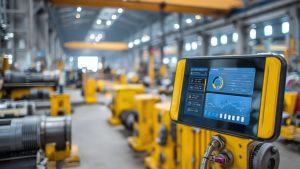Picture this: machines that think and learn, just like us. This isn’t science fiction—it’s happening now with artificial intelligence in engineering. This article will explore how AI is transforming the engineering world.
AI revolutionizes engineering, making processes safer, more efficient, and more innovative. It’s creating design optimization opportunities we never thought possible.
Table of Contents:
- What is AI in Engineering?
- Key Benefits of Using AI in Engineering
- How AI is Transforming the Engineering World: Real-World Applications
- Challenges and Future of How AI is Transforming the Engineering World
- Conclusion
What is AI in Engineering?
Artificial intelligence (AI) teaches machines to think and analyze like people. In engineering, this means using systems to learn algorithms for smarter designs and quicker builds and understanding AI for predictive upkeep.
AI technologies change how engineers approach each project stage. This leads to breakthroughs in leveraging AI.
Key Benefits of Using AI in Engineering
Using AI tools offers significant advantages. AI provides valuable insights from robotics automation, improves efficiency, and supports data-driven decisions. It changes traditional engineering by performing tasks with vast amounts of data.
Enhanced Efficiency
Think about repetitive tasks that consume an engineer’s time. AI systems can handle these, freeing engineers for creative problem-solving. This changes traditional engineering practices.
AI algorithms automate these time-consuming, repetitive tasks. This allows engineers to focus on higher-level decision-making. Automating repetitive tasks leads to more strategic work.
Predictive Maintenance
AI-driven predictive maintenance uses data analysis to anticipate equipment failures. This form of design optimization helps catch potential issues early, reducing downtime and extending equipment life.
Predictive modeling identifies potential failures before they escalate. This keeps projects on track and facilitates process optimization to reduce downtime. Using AI in engineering practices provides real-time feedback for better decision-making.
Design Optimization
Generative design uses AI to explore countless design options. This rapidly identifies the most efficient data use, saving time and resources, which helps product design.
Advanced machine learning algorithms and advanced algorithms optimize designs further. AI applications find better design solutions. It helps products meet technical specifications efficiently.
Improved Safety
AI can perform dangerous tasks in hazardous environments. Robotic systems protect human workers, making projects safer. AI technologies also make it easier to maintain safety measures.
Data-Driven Decision Making
AI gives engineers real-time data. This data informs better choices. Data-driven decisions improve project accuracy.
AI systems leverage large datasets for better understanding. This data analytics helps optimize manufacturing processes and provide valuable insights. AI in engineering practices helps to achieve more successful outcomes. Analyzing vast amounts of data facilitates this.
How AI is Transforming the Engineering World: Real-World Applications
AI’s impact spans various engineering fields. It’s changing design, production, and even interdisciplinary collaboration.
Smart Cities
AI plays a pivotal role in designing efficient cities. By analyzing information about resource consumption, AI systems optimize designs. This leads to better urban infrastructures and improved sustainability.
Machine learning systems help identify patterns, contributing to learning algorithms for optimizing resource allocation. AI technologies transform civil engineering by automating repetitive tasks and enabling efficient data use for urban planning.
Healthcare Engineering
AI transforms medical devices and healthcare. It changes everything from diagnosis to robotic-assisted surgery. AI systems can even take on dangerous jobs, thereby keeping human workers safe.
Advanced machine learning contributes to new treatments. AI-powered robotic systems provide support during surgeries. These systems can even perform tasks previously thought impossible.
Automotive Industry
Self-driving cars use autonomous systems, which is changing product design within the automotive industry. They also help reduce traffic congestion.
These autonomous vehicles leverage AI for navigation. They also improve fuel efficiency and provide better sustainability through efficient data use. AI algorithms are critical to the functionality of self-driving cars.
E-Commerce
From targeted ads to product recommendations, AI shapes the online shopping experience. Generative AI improves operations and customer satisfaction. AI technologies make it easier to provide personalized services.
Systems leverage deep learning for better personalization. Analyzing vast amounts of data enables businesses to tailor products to specific user needs, and these machine learning algorithms ensure products meet customer expectations.
Recruitment
In human resources, AI transforms talent acquisition. Automating sourcing and screening streamlines recruitment, and effective recruitment finds the best fit for open positions.
AI algorithms help evaluate candidates. Systems AI aids in matching candidate profiles with job descriptions, allowing companies to leverage AI engineering AI in recruitment.
Challenges and Future of How AI is Transforming the Engineering World
While AI offers progress, challenges and opportunities exist around its integration. Addressing these issues is key to harnessing AI’s full potential. This includes having a strong understanding of how AI is transforming the engineering world.
Challenges of Integrating AI
Ethical use and security of AI systems are crucial. Data privacy, the need for AI professionals, and job displacement are valid concerns. Ensuring accurate professional engineering inputs is vital, as misinformation can quickly become a problem.
AI engineering AI needs robust security measures. Safeguarding data through proper security protocols is essential. Human intervention remains necessary to validate data analysis and maintain appropriate standards.
Future Outlook for AI in Engineering
AI’s future in engineering is promising. Human foresight is crucial for ethical use, and advances in algorithms and modeling will drive integration.
Human creativity and ingenuity remain essential. Collaboration across fields, like civil engineering, will enhance intelligent design and lead to effective human-centered solutions. AI provides numerous possibilities.
Focusing on engineering AI development is key. Systems powered by machine learning and advanced machine learning can provide a starting point for many engineering projects. Interdisciplinary collaboration is key to using these AI technologies.
Conclusion
From self-driving vehicles to clever cities, the AI era is remodeling the panorama of engineering design, imparting modern answers to complex issues. As this modification unfolds, moral issues around records, privacy, sustainability, and responsible improvement have become central to the conversation. Navigating these issues requires a balanced understanding of changing engineering paradigms’ immense potential and challenges.
Collaboration between humans and machines has become the cornerstone of modern innovation. Integrating AI tools into engineering processes involves advanced algorithms, deep learning techniques, and critical human oversight. This synergy enables adaptive learning systems that optimize processes, paving the way for more efficient and sustainable designs.
As AI systems evolve and reshape engineering design, it is crucial to implement robust ethical guidelines and security frameworks to protect data and prevent misuse. Embracing an interdisciplinary approach to this evolution ensures that the benefits of AI are maximized while addressing risks associated with changing engineering practices. By fostering foresight, adaptability, and collaboration, the future of engineering can thrive in this era of rapid technological advancement.



